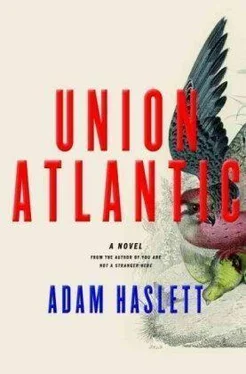Reports on yesterday’s incident were still coming in, Vrieger had told him. At the base, command wasn’t letting the crew see or hear any news from the outside.
It was Vrieger who had reached his hand up to the ceiling panel and turned the key, illuminating a button on Doug’s console he’d only ever seen lit in the dwindling hours of war games: permission to launch.
“Marlboros,” he said, leaning his elbows on the counter, trying to put a stop to the spinning motion in his head. “Give me Marlboros. All of those cartons. I need all of them.”
The shopkeeper stepped onto the second rung of his ladder and reached up to the shelf, where the red-and-white boxes were stacked. Down to his left, behind the counter, a television sat atop a milk crate, the sound turned off. A mustachioed announcer in a double-breasted suit spoke directly to the viewers. The screen then cut to an overview of the inside of an air hangar filled with rows of boxes, groups of people walking along the aisles between them; then came a cut closer in: a man in uniform opening a long black bag for the camera, which zoomed in to hold the shot of a young woman, twenty-five maybe, though on the grainy screen, her face bloated, who could tell? Her corpse grasped in stiffened arms a child of three or four, his body and little grayed head mashed to his mother’s chest. The dead arms gripping tightly the dead boy.
“Eighteen miles,” someone — Doug still didn’t know who — had shouted into the waning strength of the command net, “possible commercial air.”
The wake of an SM-2 missile looked like a miniature version of the space shuttle blasting off from Cape Canaveral, the launch fuel burning a hot white plume. But down in the battle chamber Doug had heard only its deafening roar and, seconds later, as the symbols on the big screen collided, the eruption of cheering.
“So,” the shopkeeper said, placing the stack of boxes on the counter and indicating the television with a nod of his head, “you know these murderers, do you?”
“My ship,” Doug said, standing up straight, whatever reprieve drunkenness had offered abruptly gone. “My ship.”
It had taken a while for the initial reports to be confirmed. “Iranian Airbus. Passengers, two hundred and ninety, over.”
The shopkeeper’s coal-black eyes widened, his upper lip quivering.
“These Iranians, they are too much, but this — this, shame!” he said, pointing into Doug’s face. “You are butchers , you and your government are butchers.”
Doug counted twenty-dollar bills from the wad in his fist, setting them down one by one on the counter.
“I’ll need a bag,” he said.
“I will not take your money!” the man shouted. “I will not take it!”
Doug counted out another three bills, placing them on top of the rest. Rage welled in the shopkeeper’s eyes.
Once he had gathered the cartons of cigarettes into his arms, Doug remained standing there at the counter for a moment. On the television, shawled women keened over a small wooden coffin.
Twenty days of his tour left now. Twenty.
“You should know, sir,” he said, “under the conditions, you should know, sir, that we would do it again.”
Then he turned and walked out of the shop and across the darkened street, throwing the cigarettes into the backseat of the jeep.
“What’s his problem?” the kid asked.
“Just drive, would you?”
As they sped along the road back to Juffair, Doug sat upright, the wind full in his face, figuring in his head how long it would take for the letters he’d mailed in Manila to make their way into the offices of the brokerages and the banks.
A plot of land. That’s what Doug told his lawyer. Buy me a plot of land, hire a contractor, and build me a casino of a house. If the neighbors have five bedrooms, give me six. A four-car garage, the kitchen of a prize-winning chef, high ceilings, marble bathrooms, everything wired to the teeth. Whatever the architecture magazines say. Make the envying types envious.
“What do you want with a mansion?” Mikey asked. “You barely sleep in your own apartment. You’d get nothing but lost.”
Finden, Doug told him. Build it in Finden.
And so on a Sunday morning in January 2001, Mikey had picked Doug up at his place in Back Bay and they had driven west out of Boston in a light snow, the gray concrete of the overpasses along the Mass Pike blending with the gray sky above as they traveled the highway that Doug had traveled so often as a kid. It had been six years now since he’d moved back up to Massachusetts from New York. What had brought him was a job at Union Atlantic, a commercial bank whose chairman and CEO, Jeffrey Holland, had entrusted Doug with the company’s expansion. In the years since, his salary and bonuses had accumulated in the various accounts and investments his financial adviser had established, but he’d spent practically nothing.
“You’re pathetic,” Mikey had said to him once, when he’d come back to Doug’s apartment for a beer and seen the college furniture and books still in their boxes. “You need a life.”
A solo practitioner, Mikey had gone to Suffolk Law at night, while he worked at a bail-bond office. He lived with his girlfriend in one of the new condos in South Boston, six stories up and two blocks east of the house he’d grown up in, his mother still cooking him dinner on Sunday nights. He liked to call himself a well-rounded lawyer, which in practice meant he did everything but drive his clients to work.
A few miles short of the Alden town line, they turned off at the Finden exit onto a wooded road that opened out into the snow-covered meadows of a golf course, used at this time of year for cross-country skiing. They passed under an old, arched brick railway bridge and soon after reached the first stretch of houses.
The town was much as Doug remembered it from the days when he’d driven his mother to work here: mostly woods, the homes widely spaced, with big yards and long driveways, the larger homes hidden from view by hedges and gates. When they reached the village center, he saw that the old stores had been replaced by newer clothing boutiques and specialty food shops, though their signage, by town ordinance, remained conservative and subdued. The benches on the sidewalks were neatly painted, as were the fire hydrants and the elaborate lampposts and the well-tended wooden planters.
On the far side of this little town center, the houses became sparse again, one large colonial after the next, most of them white clapboard with black trim. They passed a white steepled church with a snow-covered graveyard and a mile or so farther along turned onto a dirt track that led down a gentle incline. A few hundred yards into the woods, Mikey brought the car to a halt and cut the engine.
“This is it,” he said. “Five acres. Up ahead you got a river. The other side’s all Audubon so they can’t touch you there. One other house up the hill to the right, and a couple more on the far side of that. Any other place, they’d put eight houses on a piece this size, but the locals ganged up and zoned it huge.”
Stepping out of the car, they walked over the frozen ground farther down the track until they reached the bank of the river. Only four or five yards across and no more than a few feet deep, it flowed over a bed of leaves and mossy rock.
“Amazing,” Doug said, “how quiet it is.”
“The town’s asking for two point eight,” Mikey said. “My guy thinks we can get it for two and a half. That is if you’re still crazy enough to want it.”
“This is good,” Doug said, peering across the water into the bare black winter trees. “This is just fine.”
Читать дальше












